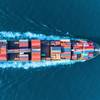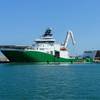Op-ed: Jones Act Waivers Do Little as Disaster Relief
Like swallows arriving in the spring, a chorus for Jones Act waivers can reliably be anticipated to accompany the annual parade of hurricanes across the geographical region covered by the Act. The logic: emergency situations dictate maximum emergency relief, and the Jones Act is perceived to be an obstacle to providing that relief. That perception is wrong.
A review of hurricane induced disaster situations over recent years reveals that maritime supply chains into affected ports are rarely a problem. Rather, distribution networks downstream of gateway ports are the principal bottleneck to widespread and effective relief supply. While not the result of a hurricane emergency, the recent logjam of containerships off the port of Long Beach provides a perfect visual image of this problem. Under the right circumstances, ships can be quickly diverted to meet demand. But unless the port and its downstream distribution networks are sufficiently sized and operating at capacity to receive a surge of product arriving, the relief being sought will idle offshore, out of reach of those who need it most.
Jones Act waivers should in almost all cases be resisted. Waivers rarely provide either economic benefit or enhanced emergency response to victims in need. More often than not, waiver requests are a form of disaster arbitrage—that is opportunistic traders looking to game the system to avail themselves of outsized profits by obtaining exemptions from rules upon which the regular transportation ecosystem is built. Generally little understood is that vessels operating under the Jones Act are usually a better source of reliable relief than are foreign flag vessels. Granting even occasional waivers perniciously undermines the stability of these regular supply chains. Doing so in a manner that offers no relief and, instead, enriches parties with no stake in the long term consequence of their actions is simply bad policy.
The author
Sam Norton is president and CEO at Overseas Shipholding Group (OSG), a U.S.-based provider of energy transportation services delivering crude oil and petroleum products throughout the United States and the world.











